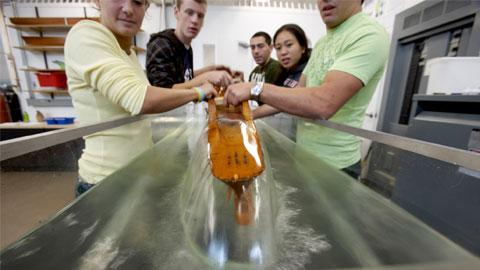Global Crude in Transit Reaches Record 1.24 Billion Barrels as Supply Surges
A flotilla of crude oil on the world’s oceans expanded to a fresh high as producer nations keep adding barrels and the tankers sail further for deliveries.

Founded in 1870 in Hoboken, New Jersey, the Stevens Institute of Technology has earned a worldwide reputation for academic excellence in the field of naval architecture and marine engineering. As a naval architect student at the US Naval Academy in the late 90s, and someone who had a rather obsessive interest in sailing yacht design, I was incredibly envious of their towing tank facility which was outfitted with a six-axis dynamometer. This same towing tank was used in the development of America’s Cup yachts in the 1930s, ship designs during World War II, as well as model testing of the world’s first nuclear-powered aircraft carrier, USS Enterprise (CVN-65).
Having worked closely with Stevens Institute since the 19th century and in recognition of the technical capabilities and contributions of Stevens Institute graduates over the years, the American Bureau of Shipping (ABS) has announced a $3 million award to the Institute to create a new civil, mechanical and naval engineering laboratory complex in the Davidson Laboratory, the home of the aforementioned towing tank.
The new complex will bear the Bureau’s name.
“It is an honor to contribute to the long-term success of the marine industry through an investment in a facility that will focus on cross-disciplinary real-world problems,” said ABS Chairman Robert Somerville. “Without question, this laboratory complex will be a proving ground where enterprising students can develop the skills they need to take on the many technical challenges ahead.”
Stevens will construct a new facility above the historic Davidson Laboratory, including laboratories critical to the Stevens strategic plan. The complex will meet the research and instructional needs of approximately 800 Stevens students annually working in such areas as robotics, underwater systems, land- and water-based vehicles, and ocean and weather sensors.
“With their significant gift, the American Bureau of Shipping contributes to the continuation of a proud 142-year tradition at Stevens – the advancement of knowledge and technology in support of the maritime community through innovative research and education,” said Stevens Provost George Korfiatis.
“The new facility will provide Stevens students with access to cutting-edge technologies so they can explore the frontiers of many vital science and engineering disciplines, especially those that contribute to the safety and security of our nation’s maritime resources,” said Stevens President Nariman Farvardin. “As we work to educate and train the next generation of innovators to create and apply new knowledge to the benefit of society, we are grateful to the American Bureau of Shipping for their generous support.”
With the opening of the new complex, the former wave tank in the Davidson Laboratory will be preserved as a significant historical center to educate students about its importance to the development of ship design during World War II.
ABS, formed in 1862 and based in Houston, Texas, develops and maintains safety rules, standards and survey data for the design, construction and maintenance of shipping vessels and offshore structures. Stevens has been an active collaborator with the Bureau since its infancy, when ABS formed the first advisory council on steel and iron vessel construction in the U.S. and included a Stevens faculty member on the council. ABS has previously contributed scholarship support to Stevens students.
For more information on Stevens visit www.stevens.edu and www.stevens.edu/news.

Sign up for gCaptain’s newsletter and never miss an update

Subscribe to gCaptain Daily and stay informed with the latest global maritime and offshore news
Essential news coupled with the finest maritime content sourced from across the globe.
Sign Up